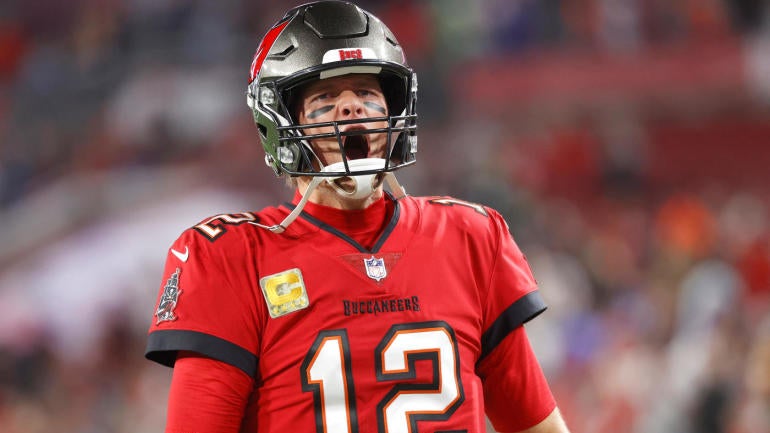
After 23 seasons, Tom Brady has finally called it an NFL career. A year after announcing a retirement that ultimately lasted just 40 days, the longtime Patriots and Buccaneers star confirmed Wednesday that he's hanging up the cleats "for good." The quarterback's decision has immediate ripple effects on the 2023 QB market, but in the bigger picture, it closes the book on an unmatched football legacy: three MVPs, three-time All-Pro, 15 Pro Bowls, seven Super Bowl wins, and countless clutch memories.
In celebration of Brady's career, which will inevitably draw one of the surest Hall of Fame nominations and inductions, here's a survey of the QB's entire 23-season run, one year at a time:
2000
After five middling seasons at the University of Michigan, Brady famously entered the NFL -- though not famously at the time -- as a sixth-round pick of the Patriots, No. 199 overall. He opened his rookie year as the fourth-string QB, eventually rising to the No. 2 role behind Pro Bowler Drew Bledsoe. He appeared in just one game, completing a single pass in a 5-11 season.
2001
With Bledsoe injured on a hard hit in the Patriots' second game of the season, Brady took over under center and remained the starter for the rest of the season. He didn't post gaudy numbers (18 TDs, 12 INTs) but went 14-3 (including playoffs) off the bench alongside a stout defense. The improbable run closed with an appearance in Super Bowl XXXVI, where Brady led a game-winning field goal drive to upset Kurt Warner, Marshall Faulk and the heavily favored Rams, winning Super Bowl MVP and delivering New England its first Lombardi Trophy at 24, making him the youngest QB to ever secure a Super Bowl ring.
2002
With Bledsoe traded to the Bills, Brady officially took over as the Patriots' face of the franchise. New England failed to reach the postseason with a 9-7 finish, but the QB emerged as a full-time starter, leading the NFL with 28 TD passes.
2003
With Coach of the Year Bill Belichick guiding the NFL's stingiest defense, Brady did his part with three fourth-quarter comebacks and five game-winning drives for the AFC's No. 1 seed, leading a 14-2 record to finish third in MVP voting. After edging actual MVP Peyton Manning in the AFC title game, Brady once again saved his best for last, defeating the Panthers in Super Bowl XXXVIII -- and winning Super Bowl MVP -- with another walk-off field goal drive.
2004
Guiding another 14-2 season, which marked an NFL-record 18-game win streak dating the previous year, Brady also logged his second Pro Bowl nod with another 28-TD campaign. He ultimately outdueled Peyton Manning and the 15-1 Ben Roethlisberger-led Steelers to advance to his third championship in four years, then turned in a near-flawless Super Bowl XXXIX performance to edge the Eagles for another ring, confirming New England as a dynasty.
2005
With injuries plaguing the Patriots' run game, Brady emerged more through the air, playing through a late-year sports hernia to lead the NFL in passing yards (4,110) and top 25 TDs for the third time in four years. New England finished 10-6 and fell to the Broncos in the divisional round, but Brady logged his first All-Pro nod and more NFL MVP consideration.
2006
Another year, another ho-hum taste of glory: Brady posted similar numbers while guiding a 12-4 finish, and the Patriots' fourth straight AFC East title. After a fourth-quarter comeback against the Chargers in the divisional round, he fell to Peyton Manning and the future Super Bowl champion Colts in the AFC Championship.
2007
Rejuvenated by a restocked receiving corps featuring big-name additions Randy Moss and Wes Welker, Brady set career marks at age 30, airing it out to lead the NFL with 4,806 yards, a then-record 50 TD passes, and 117.2 passer rating. His Patriots, meanwhile, went a perfect 16-0, becoming the first team to go undefeated since the 1972 Dolphins, rolling all the way to Super Bowl XLII. This magical run will always be remembered for its infamous finish, with Eli Manning and the Giants upsetting New England in the big game, but Brady reigned supreme for almost the entire year, easily winning his first NFL MVP.
2008
Early in the Patriots' season opener, Brady suffered a torn ACL and MCL on a low hit against the Chiefs, forcing him to miss the remainder of the year -- and snap a streak of 111 consecutive starts. New England proceeded to finish 11-5 with backup Matt Cassel under center, but failed to reach the playoffs for the first time in six years.
2009
Battling finger and rib injuries, Brady topped 4,000 passing yards for the third time, guiding a 10-6 finish before a wild-card loss to the Ravens. He was named Comeback Player of the Year for his seamless return to the QB leaderboards at 32.
2010
Fresh off a contract extension making him the NFL's highest-paid player, Brady became the fastest QB to log 100 career wins as part of another 14-2 season. The Patriots went one-and-done in the playoffs for the second straight year, falling to the Darrelle Revis-led Jets, but Brady easily claimed MVP, All-Pro and Offensive Player of the Year honors with league-leading passing production (36 TDs, 4 INTs).
2011
Approaching his mid-30s, Brady remained one of the NFL's busiest passers, feeding Wes Welker to become just the fourth QB in history to eclipse 5,000 yards. His efforts, which included 39 TDs and another 100+ passer rating, earned another Pro Bowl nod and helped New England to a 13-3 finish, as well as a trip to Super Bowl XLVI -- his fifth career title game. Once again, the underdog Giants prevailed on the big stage, leaving Brady in search of his next ring.
2012
Brady and the Patriots failed to return to the Super Bowl, falling to the eventual champion Ravens in the AFC title game, but only after the QB led yet another 12-win season and AFC East title run with at least 30 TDs. Once again a candidate for Offensive Player of the Year, he became the first QB to lead 10 different division championships, and surpassed 49ers legend Joe Montana for all-time playoff wins, with 17 in just 12 seasons as a starter.
2013
At this point, a 12-4 finish and playoff run just feels ... boring, right? But that's precisely what Brady delivered as the NFL's runner-up MVP finalist, willing a new supporting cast to his fifth straight postseason, where the Pats advanced to the AFC Championship before falling to the Peyton Manning-led Broncos, who went on to win it all two years later.
2014
Durable and productive even at 37, Brady cruised through another 12-4 season with 4,000+ yards and 30+ TDs, rolling past the Colts with a 45-7 AFC title-game drubbing, then leading a record 10-point fourth-quarter Super Bowl comeback against the "Legion of Boom" Seahawks defense for his fourth Lombardi, tying him with Joe Montana and Terry Bradshaw for the most championships of any QB in NFL history.
2015
Now fast approaching 40, Brady led the Patriots to a sixth straight season with at least 12 wins, going 12-4 while again leading the NFL in passing TDs (36), throwing just seven picks and beginning a three-year run of 100+ passer ratings. Back in the postseason, he helped New England advance to its 10th conference championship game since the turn of the century, falling to the eventual champion Broncos.
2016
One of the most dramatic seasons in Brady's illustrious career, this one began with the QB suspended four games for his involvement in the infamous "Deflategate" scandal, in which the NFL alleged New England had intentionally deflated footballs for better grip in the 2014 AFC title game. Fresh off his punishment, Brady proceeded to dominate headlines for all the right reasons, helping the Pats clinch a record seventh straight first-round playoff bye, finishing second in the MVP race by throwing 28 TDs and just two picks. Facing the high-scoring Falcons in Super Bowl LI, Brady and Co. trailed 28-3 midway through the third quarter, only to storm back, force the first overtime in Super Bowl history, then win it all for the QB's fifth Lombardi Trophy.
2017
Brady somehow reached new heights coming off his historic comeback, easily leading the NFL in both pass attempts (518) and yards (4,577), with 32 TDs and eight picks, to win his third and final MVP at age 40. He helped New England reach Super Bowl LII after a 13-3 finish, giving the Patriots a record 10 different Super Bowl appearances, and went blow for blow with the underdog Eagles, who claimed a 41-33 upset in a game that featured more combined offensive yardage than any in history.
2018
Motivated to avenge his big-game loss to Philly, which saw backup Nick Foles outduel him to win Super Bowl MVP, Brady experienced a slight dip in passing production, yet still ranked among the AFC's best to claim a 14th Pro Bowl nod. His Patriots finished 11-5 before advancing to Super Bowl LIII, where he controlled the ball in a low-scoring win over the Aaron Donald-led Rams, becoming not only the most accomplished Super Bowl player in league history but the oldest QB to ever win it all.
2019
Brady's 20th and final season in New England was both predictably successful and yet, by his standards, a disappointment. The numbers reverted to those of his earlier days (24 TDs, 8 INTs, 88.0 rating), and the Patriots went 12-4 but fell to the Titans in their first playoff game, sparking speculation that Brady might finally be growing tired of Belichick's disciplined but old-school approach and, more importantly, losing some of his trademark touch.
2020
The impossible occurred after Brady's 20th season: he announced plans to test free agency with his Patriots contract expired, then promptly signed a two-year deal with the Buccaneers, a franchise that had missed the playoffs for 12 straight seasons. Luring ex-Patriots star Rob Gronkowski out of retirement, Brady showcased improved arm strength as his Tampa Bay debut progressed, throwing 40 TDs for just the second time in his career while leading an 11-5 record during the COVID-19 pandemic. The 43-year-old was at his best in the season finale at the Bucs' own stadium, guiding a 31-9 rout of the reigning champion Chiefs in Super Bowl LV, completely rewriting Tampa's identity as a present-day powerhouse.
2021
Even after his seventh championship -- a record for any NFL player ever -- Brady returned for another go-round and inexplicably looked even more physically prepared for his age-44 campaign, garnering MVP consideration after leading the NFL in passing completions (485), attempts (719), yards (5,316) and TDs (43). His Buccaneers remained well-rounded to go 13-4 but lost a narrow contest to the eventual champion Rams in the divisional round.
2022
After leading the most successful back-to-back seasons in Buccaneers history, Brady announced in February that he would be retiring, only to abruptly return 40 days later, at age 45. He became the oldest QB to ever start an NFL game, leading another division title but with the first losing record (8-9) of his career. Under a new coach and amid both an injury-prone lineup and a public off-field divorce, he looked more pedestrian than ever before. He officially retired -- this time "for good" -- after the season, his unmatched legacy etched into both his own feature film and the league he headlined for so long.
















